Interviews
Santiago 25 years later and finding one’s Personal Legend:
In conversation with Paulo Coelho, best-selling author of The Alchemist
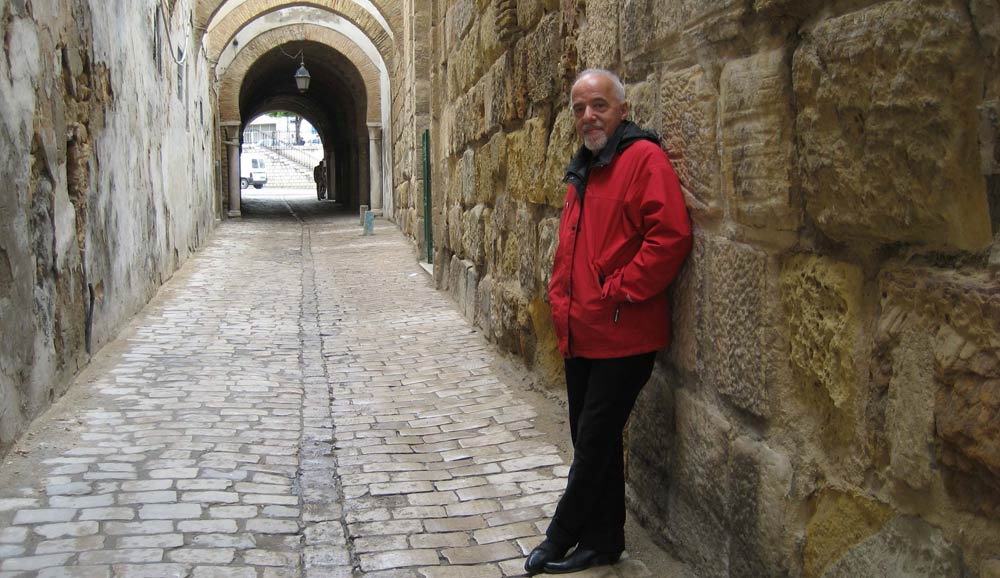
About 10 years ago, I leaped from one stage of life to a completely inexperienced other. Unsure, lost, confused and scared, I just didn’t know where I belonged and what I should be doing. And then I came across some quotes. “Everyone on earth has a treasure that awaits him. We, people’s hearts, seldom say much about those treasures, because we no longer want to go in search of them.” Followed by, “When you want something, all the universe conspires to help you achieve it.”
The lines were in reference to the journey of a young boy named Santiago who also leaped into the abyss of the unknown future guided only by his heart. The book was The Alchemist. The impact was resounding. I came to realize that I must share this moment of apprehension and fear with so many who are at crossroads in ones life and take that leap anyway knowing that there could be something good awaiting me in the world — my own treasure guided by my heart — with billions of readers around the world.
This was my introduction to the works of Paulo Coelho. And in trying to find the right words to describe him, I realize that simply “writer” falls short — way too short. He is like a spiritual guide, a whisperer of the secrets of the world. And it is in that way that I sought out an interview with the legend himself.*The interview which has been transcribed from an audio conversation has been edited for clarity.
The Islamic Monthly: It has been 25 years since you published The Alchemist, in which you write of the protagonist Santiago taking his journey in search of his Personal Legend. What would have changed for Santiago, if anything, in these 25 years if you were to converse with him now? Where would he be now?
“It is about building bridges among cultures, different cultures.”
Paulo Coelho: Well, I will not change anything. I think that the book itself, The Alchemist, was a metaphor of my own life. When I was 40, I wrote my first book, The Pilgrimage, and I said to myself, “why did it take so long for me to write this book?” Because my dream, since I was 10 years old, was to be a writer. I said, I have to revisit my life using a metaphor, and the metaphor was basically this boy that has a dream and has to go far away to realize that his dream is close to him. And everything is a matter of courage.
So, when I wrote The Alchemist, I thought that I should revisit my life. I was not searching for my treasure. My treasure is my journey, the same as for the shepherd boy. When I wrote The Alchemist, I decided that I have to continue my journey.
Every new book is a challenge. I could, of course, have stopped many years ago if it was only for money. But no, it is about building bridges among cultures, different cultures. Islam has a lot of fantastic stories and they transmit a lot of teachings through stories, but when you want someone to understand something that is not forcefully in your culture, you use stories. The Sufis, they have their master of story telling and [the same in] Arab culture: You can go back to Arabian Nights, [which] had a huge influence on me, Scheherazade and all the other stories, so then I started understanding and loving Arab culture.
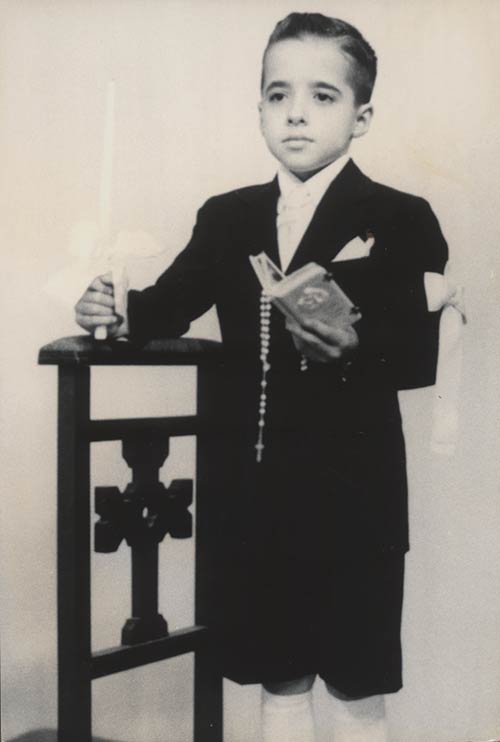
08 September 1956
TIM: If you were to re-imagine Santiago’s journey after all these years of writing him, what wisdom or introspection on life have you acquired that you would now impart on Santiago or his journey to understanding the Soul of the World? What would you want to convey to him, or your readers, all these years after having written the book?
Paulo Coelho: I do not want to convey anything, I just want to share my soul. When you write a book, you don’t write focusing on this and that. I am not preaching anything. I think that a writer is basically someone who shares his or her value or vision of the world, and this is what I wanted to do.
You have to be in perspective but also connect to people. This is what I did after I started publishing books. I started traveling and meeting people because my soul met my readers before my body or my physical presence did. So, everybody has to share something. This is one of the most important laws of the human condition, is the necessity to share. So, what I did, what I do, is basically to [be in perspective] at the moment that I write, but also to explain my soul, to share my soul. So, this is the task of the writer — but not only of a writer, of every human being — it is to share something that he or she has.
TIM: Does Santiago, or any of your characters, stay with you years after you imagine them? Do you tap into him in your own personal life?
Paulo Coelho: Well, I am still Santiago. For many years I was trying to find answers only through books but then I realized that basically, life is about experience and the thing that you have to do is experience life instead of only reading about it. Reading is very important, but it’s not enough. After reading, you have to take some decisions in your hands and move forward and be the human being that you are, and then going and meeting people and work. And conveying some part of yourself.
TIM: A common thread I notice in many of your books is they are set in a time of simplicity, a pre-modern, almost medieval or ancient time, something apart from the modern. Is the journey to one’s Personal Legend somewhat easier in a time when we are not burdened with the technologies and connectedness of modern times? How do you believe that finding one’s Personal Legend can exist in the highly connected, yet ironically isolating world of today? How would you believe your characters — Santiago or yourself in The Pilgrimage — would fare with access to modern technologies in your journeys?
“To follow your Personal Legend, you only need to have one thing: It is will. Will to do it.”
Paulo Coelho: We don’t need it to be complicated. Simplicity is the heart of everything. If you look to the desert, apparently the desert is very simple but it’s full of life, it’s full of hidden places and the beauty is that it looks simple but it’s complex in the way that it expresses the soul of the world or God. When you are in the desert, you tend to be much more in a state of meditation because you are there, you are not distracted. But that means that the desert itself, its simplicity is complex in that sense. Imagining a desert that was full of colors, that would be the disaster.
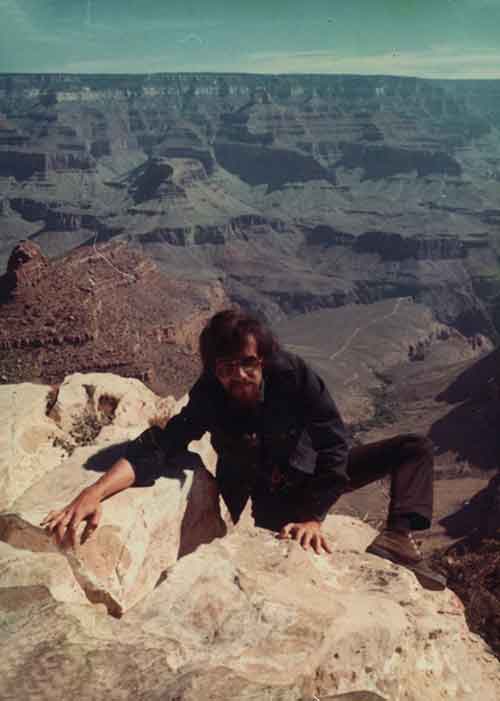
Arizona/E.U.A. - Grand Canyon
The people in my books, they don’t have iPads, etc. But today, we have this technology, these new technologies and this allows me to reach many more people, not in the sense of promoting anything, but share freely stories in my blog, you know, my Twitter, my Facebook. And this is the drive for a writer: It is to see that people go there and they read. So, being greedy today, we have these tools at our disposal and we have to use these tools. The tools itself are, they don’t have a value like a hammer. You have a hammer and you can use this hammer to break someone’s leg or you can use this hammer to build a beautiful thing, a beautiful house. So, what I try to do is, my social communities, is basically to build something that may reach people, who normally don’t have money to buy books.
So, I will not blame technologies at all. Connectivity — they are excuses for people to not follow their Personal Legend. To follow your Personal Legend, you only need to have one thing: It is will. Will to do it. Because God has a plan for you, you are here in this world because God has a plan for you. And the problem is that people start listening to other people and they forget to listen to their heart and to see what is the plan that God has for you. So, you normally blame law — Oh, I cannot do this because my wife or my husband, or I needed to do this and that and that first. No. Your first and most important to task is to fulfill your Personal Legend and there is no selfishness in this. If you are happy, you are going to spread happiness, you are going to have difficult moments, of course, but you have difficult moments also not following your Personal Legend. You are not following your bliss, not following your destiny. Maktub. So, what is written for you is not always easy but it is what you should follow, what you should read and follow. I never thought about the main character of the pilgrimage, that it is me. I did this pilgrimage in 1986 and this was my transition, my turning point, when I realized that to dream is not enough, you have to fulfill your dream, you have to pay the price of your dream.
TIM: As you referenced earlier, a lot of your works use Arabic or Islamic terms, settings, words, characters, locations and cultural forces. Given that you are from Brazil and write in Portuguese, where does this inclination toward Arabic come from? How do you believe readers have responded to that?
Paulo Coelho: Yes. I am from Brazil, I write in Portuguese but I was always fascinated by the Arab culture. And again, we go back to story telling — my first contact was with Arabian Nights. So, there is this mysterious culture that I said is so fascinating, I have to dive deep into this, which I did. So, first I start reading and then I traveled to some Arab countries and then I could see your culture. … I am a great admirer. How people react to this, I don’t know, but if we see how my books sell, they react very well. Probably there is this curiosity about your culture, sometimes people are very biased, they do not know, they don’t want to accept this. But we are fascinated by the Arabic culture and if [there is a chance for someone like] me, who is not an Arab, to share, more people will be open to this.
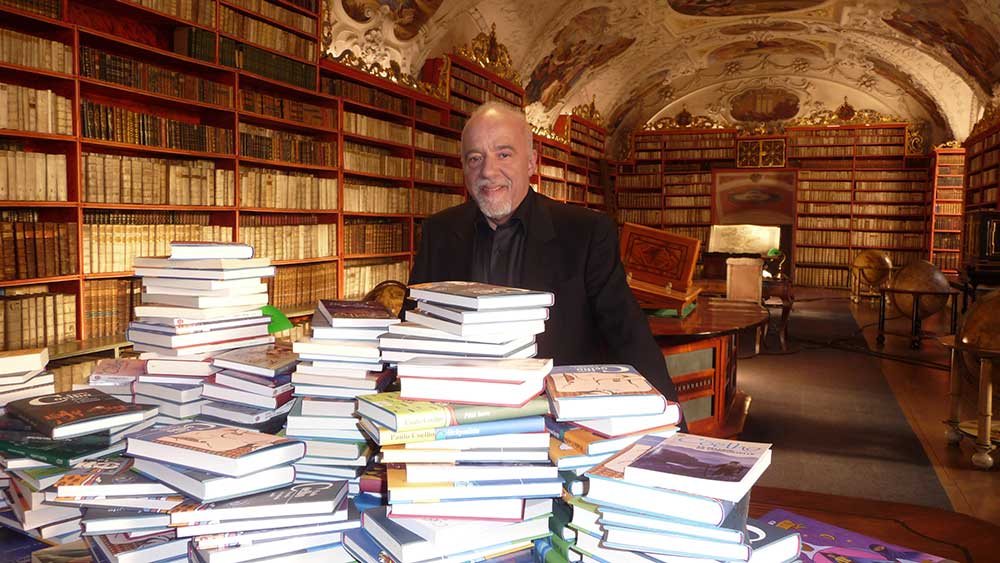
TIM: In The Pilgrimage, your first novel, you talked about spending months deciding on if you should take the journey on the Road to Santiago. The same goes for the young shepherd boy Santiago in The Alchemist, who for a while justifies to himself that he should remain a shepherd, given that he knows the land, he knows his sheep that depend on him. You write: “We are afraid of losing what we have, whether it’s our life or our possessions and property. But this fear evaporates when we understand that our life stories and the history of the world were written by the same hand.” How can one really find the extraordinary in the ordinary without needing such a powerful, exhausting, physical journey as one in The Pilgrimage, The Alchemist? Do all searches for the Personal Legend require a long journey?
Paulo Coelho: Nothing is ours. We are here because we are made by God, we will return to God. So people who think that they are something, they are totally wrong. And this is the most beautiful thing in life, it is that we don’t own anything. So, everything is ours in the sense that we have the world to explore and not things to carry, a burden to carry.
As for the Personal Legend, I think we all go through this right of passage, that it is liberating ourselves from what society tries to impose on us, and being who we want to be. Sometimes, it takes a few years, and sometimes they will never accept, so, they start blaming other people for being frustrated. But I am very optimistic in the sense that I want them, and I write with this goal in mind, to give an image to fulfill your dream because this is the reason you are here.
TIM: Have you done the journey on the Road of Santiago again since you did in 1986? How can it be that the “roads” we traverse upon daily, routinely (our scheduled lives) could bring to us new meanings when we’ve already explored and been there once or many times before? If you were to do the Road to Santiago journey again, would it have the same impact?
“I traveled to some Arab countries and then I could see your culture. … I am a great admirer.”
Paulo Coelho: I did it physically, the journey to Santiago, in 1986. And then I went again, but by car. You never repeat some experiences in your life. Most experiences provoke a transformation in you. So, when you live something, live it fully because you never know when this is going to happen again and not only that, if it even happens again, it will not have the same impact. This is what is beautiful about children. They are always looking at the world as if it was for the first time in their lives. So, we should always look to the world with the eyes of a child. I am not saying be naïve, I am saying be innocent in the sense of discovering things. Have some bound curiosity. I am always trying to discover new things. This is how I dove deep into this technological world. Now, I have this blog and I have Facebook and I have Twitter because it was curiosity, “Why are people there?” I am so surprised why so many authors are so reluctant, they are not accepting that writing is not only books, that there are so many possibilities of writing things in so many different platforms. So, curiosity led me there and I hope that curiosity is opening all the different doors for me.
TIM: I want to ask you about Love. It’s often said that with time and age and wisdom, there comes a new appreciation or understanding of Love. In the 25 years since imagining Santiago, how do you believe Fatima and Santiago would grow to understand Love if you were to relate that to your own understanding of Love as it evolved and changed over the past several decades? As you write so eloquently: “Love. Something older than humanity, more ancient than the desert. It is pure language of the world. It requires no explanation. It’s that someone in the world awaits you whether it’s in the middle of the desert or in some great city. And when two such people encounter each other, and their eyes meet, the past and future become unimportant. It is written by the hand that evokes love.”
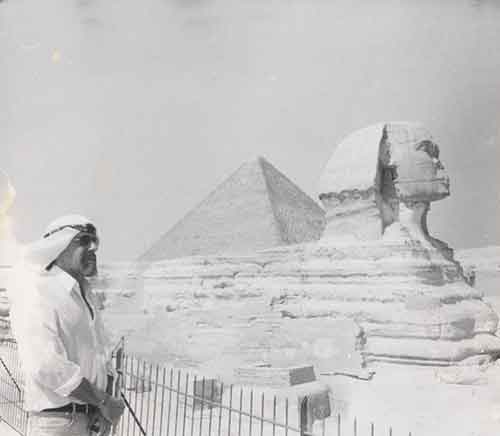
Oriente Medio - 1987
Paulo Coelho: Oh, I don’t know how Fatima and Santiago will behave now, because I left them. … Santiago returns to Fatima and from this moment on, it is their life. I am not the one who is going to check what’s going on between Santiago and Fatima. That’s for them to fulfill their lives with love. Because love is the only thing that counts. Love is what keeps the star and the human beings and the world turning around. So, love is the force that binds the whole universe together. I do believe that when we want something, the whole universe conspires to help us. The problem is, this sentence is something that it is a double-edged sword. If you want something positive, the universe conspires to help you. If you want something negative — even unconsciously, because people have this tendency to understand that suffering is something that they need — the universe will conspire with us. So, be very careful on your wishes because at the end of the day, whatever you want to do yourself, positive or negative, you are going to have this dream fulfilled.
TIM: That’s one of the most quoted lines of your book in The Alchemist: “When you want something, all the universe conspires to help you achieve it.” A big theme in your books focuses on this inward and outward balance, finding and listening to oneself inwardly and locating the outward balance to achieve it. Do you believe that the successes of your books around the world indicate that people are becoming more spiritual? It’s obvious that your books are universally loved. Is it perhaps because they are so universally equal or is it related to a global longing for something that may have been absent or different if you were to write the same books say 100 years ago or 100 years from now?
Paulo Coelho: I don’t understand the success of my books and what I write. I am not trying to understand because then I am going to start to write using a formula, and from the moment that I use a formula, my readers will never forgive me. They can’t forgive me for a bad book, like The Winner Stands Alone. I loved to write this book but apparently it did not touch a chord in my readers’ soul. But they can forgive me if they realize that I am repeating over and over the same story. That’s why 25 years I’m writing books, a quarter of a century, and every time that I release a new book, they are very successful because the reader understands that I’m not repeating the same formula.
“I traveled to some Arab countries and then I could see your culture. … I am a great admirer.”
And then you ask about 100 years ago, 100 years from now. I have no idea. I am living here and now, this is the blessing of my life is that I am totally concentrating on the present moment. And I want to be because there is nothing but the present moment.
TIM: How do you wish to be remembered? You have this incredible motivational, spiritual thread throughout all your books.
Paulo Coelho: Someone that was honest to his task, to his books. Whatever I did, I did with love and I did with honesty.
TIM: What is one thing most people would be surprised to know about you?
Paulo Coelho: I am a very good archer. I use archery as my way of meditation. I cannot sit down and just meditate in the classical sense. I am very active. So, I use archery. I have my bow, my arrow and I use this tension and relaxation in the second after throwing the arrow. And it is my way to meditate and this is the only thing that clears my mind. Because when I walk, and I walk a minimum of 6,000 steps every day … when I walk, I think. When I do archery, I’m not thinking, I am totally there with my bow, my target, my arrow, and I don’t think, I am communion with the universe.
“Nothing is ours. We are here because we are made by God, we will return to God.”
Paulo Coelho is the author of the international best-seller The Alchemist, which has sold over 65 million copies and has been translated into 80 different languages. He is the author of 30 books.
Amina Chaudary is the founder and editor-in-chief of The Islamic Monthly and host of That's Some American Muslim Life.